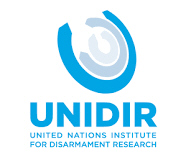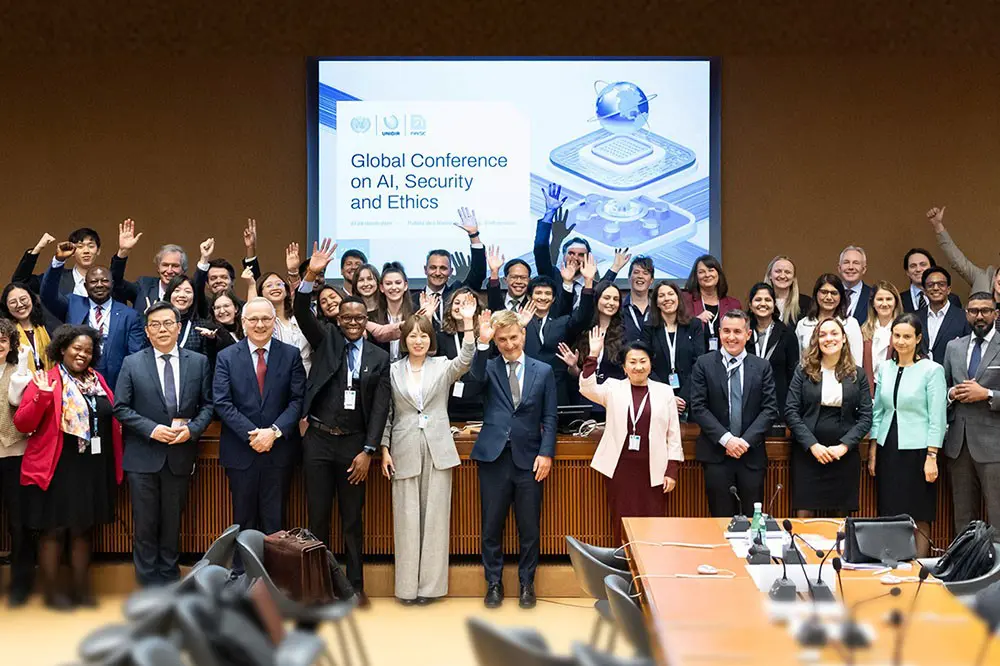A Landmark Forum for AI Governance in Security and Defence
ARTIFICIAL INTELLIGENCE-AI, 7 Apr 2025
Jessica Abowitz and Yasmin Afina | UNIDIR – TRANSCEND Media Service
14 Mar 2025 – The international community is grappling with the rapid advancement of AI technologies, including their implications on global, regional and national peace and security. While new AI systems and applications offer opportunities both in the military and security domains, their development, deployment and use bring legal and ethical considerations, as well as risks.
Policymakers and regulators worldwide have begun to recognize the urgency of shared understandings, norms and standards that transcend national borders and individual interests, especially in the context of AI’s applications for security and defence. This highlights the need for a platform to enable meaningful engagement with State and non-State stakeholders.
https://x.com/UNIDIR/status/1904936133890277684
Shaping responsible AI governance
In late 2024, the UN General Assembly First Committee approved resolution on military AI governance. The resolution builds on the growing interest of States and the wider international community to assess the implications of AI in the military domain. It calls for submissions from States and stakeholders to address the opportunities and challenges AI poses to international peace and security.
In parallel, the international community has been deliberating on lethal autonomous weapons systems – a very specific subset of military AI, notably within the context of the Convention on Certain Conventional Weapons and its Group of Governmental Experts. Efforts to expand discussions beyond the convention have led to two resolutions adopted by the UN General Assembly in 2023 and 2024, emphasizing the need for responsible governance in this space.
The UN Secretary-General’s agenda has also prioritized the impact of emerging technologies in global security. Notable initiatives include the High-Level Advisory Board on AI; a resolution advocating for safe, secure and trustworthy AI for sustainable development, and a resolution promoting international cooperation in AI capacity-building. Commitments laid out in the Pact for the Future also include advancing discussions around lethal autonomous weapons and assessing the existing and potential risks associated with the military applications of AI.
How UNIDIR is driving AI security and ethics
To support these global efforts, UNIDIR launched the Global Conference on AI, Security, and Ethics 2025, a flagship event under the Roundtable for AI, Security, and Ethics, in partnership with Microsoft. This initiative aims to facilitate cross-regional and multisectoral dialogue, fostering cooperation across geopolitical divides.
The conference provided a platform for multistakeholder cooperation and ethical governance of AI, aiming to ensure its responsible development and deployment in security and defence. A message from the Secretary General, in support of the conference, was read during the opening by Izumi Nakamitsu, Under Secretary General and High Representative for Disarmament Affairs.
https://x.com/UNIDIR/status/1905173782945214731
Over two days, the conference presented insights from over 50 global experts and included keynotes from leading voices in diplomacy, defense, technology, and humanitarian sectors. Key themes included AI’s role in military applications, cybersecurity, international law, human rights, and disarmament.
The programme facilitated interactive exchanges, lightning talks, and deep dives and featured high-level panels with UN and tech leaders on AI’s role in peace and security. Sessions explored AI-induced destabilization and security risks, as well as include presentations on AI in UN peacekeeping. A regional perspectives panel also addressed AI governance across different geopolitical contexts.
The Global Conference on AI, Security, and Ethics 2025 served as a cornerstone event in shaping the international governance of AI in security and defence. By bringing together diverse stakeholders, UNIDIR is committed to fostering open, independent and evidence-based discussions to navigate the evolving landscape of AI governance.
https://x.com/UNIDIR/status/1905674825214939609
Latest insights from UNIDIR’s research
UNIDIR’s Security and Technology Programme is documenting where the points of convergence and disagreement are on many policy aspects of AI in security and defence. It provides expertise and support for States’ strategy and policy development, with key publications on AI including:
- Governance of Artificial Intelligence in the Military Domain: A Multi-Stakeholder Perspective on Priority Areas – Insights from government representatives, industry and the research community provided during the first convening of the Roundtable for AI, Security, and Ethics.
- AI in the Military Domain: A briefing note for States – As a follow up to the UN General Assembly resolution on AI in the military domain, this brief includes contextual information on the topic, a set of considerations for States to refer to, and a list of suggested readings that draws on UNIDIR’s own research and selected external publications.
- The Global Kaleidoscope of Military AI Governance – Key outcomes of the five regional consultations around responsible AI in the military domain held in 2024, in the lead-up to the second Responsible AI in the Military Domain Summit.
- Draft Guidelines for the Development of a National Strategy on AI in Security and Defence – An opportunity for States and all relevant stakeholders involved in the development, adoption, implementation and review of national strategies on AI in security and defence to contribute to policy development.
- Artificial Intelligence Beyond Weapons: Application and Impact of AI in the Military Domain – An exploratory report detailing 18 more applications of AI in defence to manage tasks other than deployment, as part of weapon systems.
- Gender and Lethal Autonomous Weapons Systems – Explores potential challenges to responsible implementation of AI in the military domain, such as gender bias.
____________________________________________
 The United Nations Institute for Disarmament Research (UNIDIR) is an autonomous institution within the United Nations that conducts independent research on pressing global challenges related to disarmament, arms control and international security. We develop innovative ideas to tackle the most pressing security issues of our world. Our research expertise frames complex challenges in accessible ways and promotes an inclusive dialogue to find creative and effective solutions. Our work aims to provide the foundations for meaningful collective action towards a more secure world.
The United Nations Institute for Disarmament Research (UNIDIR) is an autonomous institution within the United Nations that conducts independent research on pressing global challenges related to disarmament, arms control and international security. We develop innovative ideas to tackle the most pressing security issues of our world. Our research expertise frames complex challenges in accessible ways and promotes an inclusive dialogue to find creative and effective solutions. Our work aims to provide the foundations for meaningful collective action towards a more secure world.
Tags: Artificial Intelligence AI, Autonomous Weapons, Defense, Demilitarization, Disarmament, Ethics, Killer robots, Militarism and AI, Militarism and science, Security, UN Institute for Disarmament Research UNIDIR, United Nations
DISCLAIMER: The statements, views and opinions expressed in pieces republished here are solely those of the authors and do not necessarily represent those of TMS. In accordance with title 17 U.S.C. section 107, this material is distributed without profit to those who have expressed a prior interest in receiving the included information for research and educational purposes. TMS has no affiliation whatsoever with the originator of this article nor is TMS endorsed or sponsored by the originator. “GO TO ORIGINAL” links are provided as a convenience to our readers and allow for verification of authenticity. However, as originating pages are often updated by their originating host sites, the versions posted may not match the versions our readers view when clicking the “GO TO ORIGINAL” links. This site contains copyrighted material the use of which has not always been specifically authorized by the copyright owner. We are making such material available in our efforts to advance understanding of environmental, political, human rights, economic, democracy, scientific, and social justice issues, etc. We believe this constitutes a ‘fair use’ of any such copyrighted material as provided for in section 107 of the US Copyright Law. In accordance with Title 17 U.S.C. Section 107, the material on this site is distributed without profit to those who have expressed a prior interest in receiving the included information for research and educational purposes. For more information go to: http://www.law.cornell.edu/uscode/17/107.shtml. If you wish to use copyrighted material from this site for purposes of your own that go beyond ‘fair use’, you must obtain permission from the copyright owner.
Join the discussion!
We welcome debate and dissent, but personal — ad hominem — attacks (on authors, other users or any individual), abuse and defamatory language will not be tolerated. Nor will we tolerate attempts to deliberately disrupt discussions. We aim to maintain an inviting space to focus on intelligent interactions and debates.
Read more
Click here to go to the current weekly digest or pick another article:
ARTIFICIAL INTELLIGENCE-AI:
